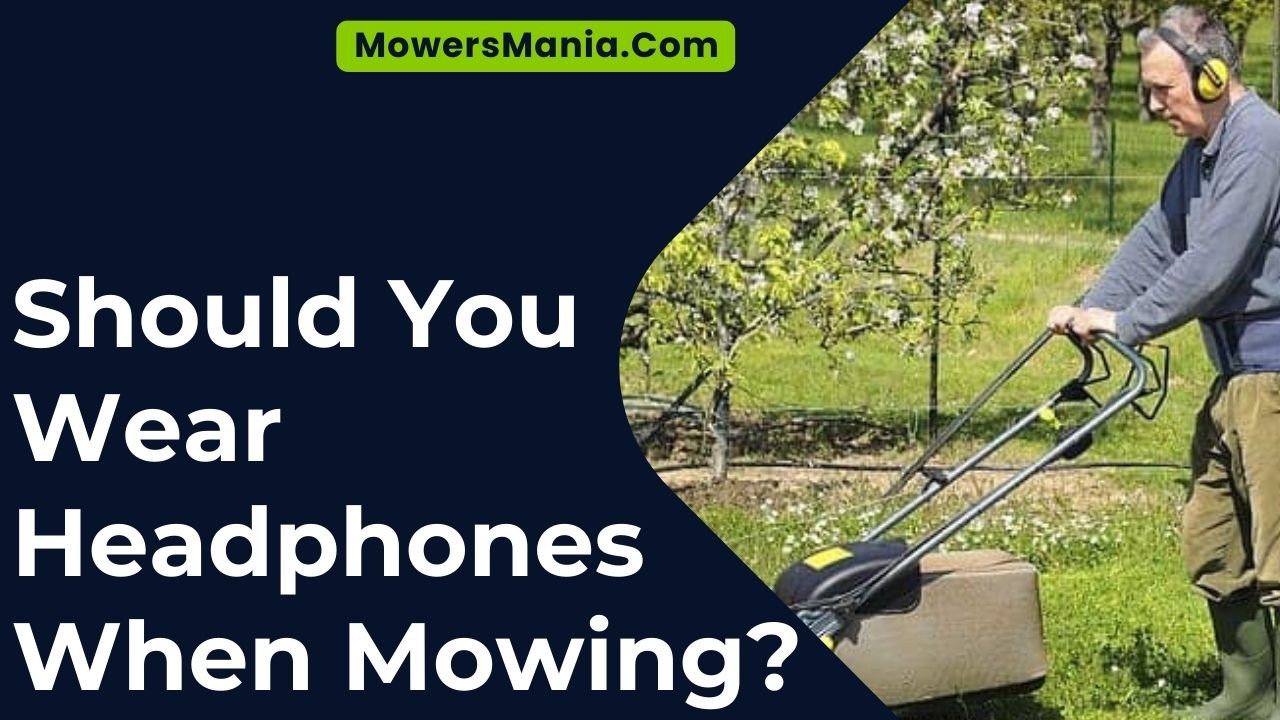As you push the lawnmower across the yard, the roar of the engine fills the air, drowning out all other sounds. You may wonder if wearing headphones while mowing is a good idea.
There are various factors to consider, including safety, potential distractions, and the benefits of listening to music or podcasts.

Before you make a decision, it’s important to weigh the pros and cons of donning headphones while mowing.
Safety Considerations
When mowing, prioritize safety by being mindful of potential hazards and taking necessary precautions. Always wear appropriate protective gear, such as closed-toe shoes, long pants, and safety goggles to shield your eyes from flying debris.
Before starting the mower, clear the yard of any objects that could become hazardous projectiles. Inspect the area for potential dangers like rocks, branches, or uneven terrain that could cause accidents.
It’s also crucial to ensure that the mower’s safety features, such as the automatic shut-off switch, are functioning properly to prevent accidents.
When operating the mower, maintain a steady pace and stay attentive to your surroundings. Avoid distractions like using headphones or earbuds, as they can impede your ability to hear approaching dangers, such as a pet or a family member entering the mowing area.
Noise-canceling Headphones

When using noise-canceling headphones while mowing, you’ll want to consider the impact on safety and noise levels.
These headphones can provide both comfort and protection by reducing the loud sounds of the mower.
However, it’s important to be aware of the potential risk of hearing damage if the headphones aren’t used responsibly.
Safety and Noise
By wearing noise-canceling headphones while mowing, you can significantly reduce your exposure to potentially damaging noise levels and protect your hearing.
Lawnmowers can generate noise levels of around 85-90 decibels, which can cause hearing damage with prolonged exposure.
Noise-canceling headphones work by actively reducing external noises, making it safer for you to mow the lawn without risking your hearing.
These headphones use microphones and speakers to pick up and cancel out external sounds, allowing you to listen to music or podcasts at a lower, safer volume while still being able to hear important environmental sounds.
It’s essential to prioritize your safety and protect your hearing, so investing in a good pair of noise-canceling headphones can make a significant difference when mowing the lawn.
Comfort and Protection
Consider investing in noise-canceling headphones to enhance your comfort and protect your hearing while mowing the lawn.
Noise-canceling headphones can significantly reduce the amount of noise reaching your ears, making the task of mowing much more comfortable.
The constant roar of a lawnmower can be fatiguing and potentially damaging to your hearing, but with noise-canceling headphones, you can mow in a more peaceful environment.
Additionally, by blocking out the loud noise of the lawnmower, these headphones can help protect your ears from potential long-term damage.
This extra layer of protection is especially important if you frequently mow the lawn or spend extended periods using noisy equipment.
Prioritizing your comfort and safeguarding your hearing with noise-canceling headphones can make mowing a safer and more enjoyable experience.
Hearing Damage Risk
To minimize the risk of hearing damage, consider using noise-canceling headphones while mowing the lawn. The sound of a lawnmower can reach up to 100 decibels, which is well above the safe limit for prolonged exposure.
Noise-canceling headphones can help reduce this risk by blocking out much of the loud noise, allowing you to listen to music or podcasts at a lower, safer volume.
However, it’s essential to use caution and not completely block out all external sounds, especially if you’re mowing near a road or in a shared space.
Benefits of Listening
Listening to music or podcasts while mowing can help make the task more enjoyable and pass more quickly.
The benefits of listening while mowing include:
- Improved Mood: Listening to your favorite music or an engaging podcast can uplift your mood, making the mowing experience more enjoyable and less tedious.
- Distraction from Noise: By wearing headphones and listening to something you enjoy, you can distract yourself from the noise of the lawnmower, reducing the potential annoyance of the sound.
- Enhanced Motivation: Upbeat music can provide you with an extra boost of motivation, helping you to mow with more energy and efficiency.
- Mental Stimulation: Engaging with a podcast or audiobook can provide mental stimulation, allowing you to multitask by mowing while also learning something new or staying updated on topics of interest.
Incorporating music or podcasts into your mowing routine can turn a mundane chore into an enjoyable and stimulating experience. Remember to consider safety precautions and be aware of your surroundings while enjoying your favorite tunes or podcasts during mowing.
Potential Distractions

While mowing with headphones, it’s important to be mindful of potential distractions that could affect your safety and focus.
Although listening to music or podcasts can enhance your mowing experience, it’s crucial to remain aware of your surroundings.
Here are some potential distractions to be cautious of:
| Distraction Type | Description | Impact |
|---|---|---|
| Noise | Loud music or podcasts can mask important sounds such as approaching vehicles or warnings. | Reduced awareness of potential dangers |
| Phone Calls | Answering phone calls while mowing can divert your attention away from the task at hand. | Increased risk of accidents |
| Conversations | Engaging in conversations with others can take your focus off operating the mower safely. | Decreased awareness of potential hazards |
| Pets or Children | Being approached by pets or children while mowing can cause distractions and safety concerns. | Higher risk of accidents |
| Environmental Sounds | Failing to hear environmental sounds like sirens or alarms can lead to dangerous situations. | Limited ability to respond to emergencies |
Alternative Options
Consider utilizing noise-canceling headphones as an alternative option when mowing to mitigate potential distractions and maintain focus on the task at hand.
These headphones can help block out the noise from the lawnmower and other background sounds, allowing you to concentrate on your work more effectively.
However, if you prefer not to wear headphones, there are other alternative options to consider:
- Earplugs: These can help reduce the overall noise level and protect your ears from potential damage caused by prolonged exposure to loud sounds.
- Work during Quieter Times: If possible, schedule your mowing sessions during times when noise levels are generally lower, such as early mornings or late afternoons.
- Landscaping Services: If the noise from the lawnmower is too distracting for you, consider hiring professional landscaping services to take care of your lawn maintenance needs.
- Manual Tools: Using manual tools like a push reel mower can significantly reduce the noise levels compared to powered lawnmowers, providing a quieter mowing experience.
Exploring these alternative options can help you find the best solution to minimize distractions and enhance your mowing experience.
Hearing Protection

You need to prioritize your hearing protection when mowing, as the noise level from a lawnmower can reach damaging levels. Without proper protection, prolonged exposure to this noise can lead to potential hearing damage.
It’s essential to understand the impact of noise on your ears and take proactive measures to safeguard your hearing.
Importance of Hearing Protection
Protecting your hearing while mowing is essential for preventing long-term damage to your ears. Using hearing protection not only safeguards your ears from the immediate loud noise of the mower but also shields them from potential long-lasting harm.
Here’s why hearing protection is crucial:
- Preventing Hearing Loss: Prolonged exposure to loud noises can lead to irreversible hearing damage.
- Reducing Stress: Constant exposure to loud noise can cause stress and fatigue, which can be avoided with proper hearing protection.
- Enhancing Concentration: By reducing noise distractions, hearing protection can help you stay focused on the task at hand.
- Promoting Overall Well-being: Protecting your hearing contributes to your overall health and well-being, ensuring you can enjoy the sounds of life for years to come.
Noise Level Impact
When mowing, wearing headphones can significantly reduce the impact of noise levels on your hearing, providing essential protection.
The noise from a lawn mower can reach up to 100 decibels, which is well above the safe limit for prolonged exposure. Prolonged exposure to such high noise levels can lead to permanent hearing damage.
By wearing headphones specifically designed for hearing protection, you can effectively reduce the noise levels reaching your ears, safeguarding your hearing.
These headphones are designed to block out or reduce loud, potentially harmful noises while still allowing you to hear important sounds, such as someone calling your name or the honk of a car horn.
Therefore, when mowing, it’s crucial to prioritize your hearing protection by wearing headphones designed to mitigate noise levels.
Potential Hearing Damage
Wearing headphones designed for hearing protection when mowing can effectively mitigate the potential hearing damage caused by the high noise levels of a lawn mower, safeguarding your hearing.
Here’s why it’s crucial:
- Noise Reduction: Hearing protection headphones can significantly reduce the intensity of the noise, lowering the risk of hearing damage.
- Frequency Filtering: Some headphones are designed to filter out specific frequencies, further protecting your ears from harmful noise.
- Comfort and Convenience: These headphones are often designed for comfort, allowing you to mow for longer periods without discomfort, and some even have Bluetooth capabilities, letting you listen to music or take calls while protecting your ears.
- Long-term Protection: Consistent use of hearing protection headphones while mowing can prevent cumulative hearing damage, preserving your hearing abilities for the long term.
Frequently Asked Questions [FAQs]
Can I Use Regular Earbuds Instead of Noise-Canceling Headphones for Mowing?
You should consider using regular earbuds when mowing instead of noise-canceling headphones. They can still provide some protection against loud noises and allow you to listen to music or podcasts while you work.
Are There Any Specific Safety Considerations for Wearing Headphones While Mowing on a Hilly Terrain?
When mowing on hilly terrain, you should be cautious about wearing headphones. It’s important to stay aware of your surroundings and any potential hazards. Consider using open-ear headphones or keeping the volume low for safety.
How Do Noise-Canceling Headphones Compare to Ear Muffs in Terms of Hearing Protection While Mowing?
When mowing, noise-canceling headphones and ear muffs both provide good hearing protection. Headphones offer added benefit of playing music or podcasts, while ear muffs may be more comfortable for extended use.
Will Wearing Headphones While Mowing Affect My Ability to Hear Potential Dangers, Such as Approaching Vehicles or People Calling Out to Me?
When mowing, wearing headphones can affect your ability to hear potential dangers like approaching vehicles or people calling out. It’s important to prioritize safety and consider using noise-canceling ear muffs or open-back headphones.
Are There Any Alternative Options to Wearing Headphones for Listening to Music or Podcasts While Mowing?
When mowing, consider using a portable speaker for music or podcasts instead of headphones. This allows you to listen to your audio while still being aware of any potential dangers around you, like approaching vehicles or someone calling out.
Conclusion
So, should you wear headphones when mowing?
It all comes down to personal preference and safety.
Noise-canceling headphones can help protect your hearing and make the task more enjoyable, but they can also be a potential distraction.
If you do choose to wear headphones, make sure to stay aware of your surroundings and use them responsibly.
And if you prefer not to wear headphones, consider using earplugs or other forms of hearing protection to keep your ears safe.



